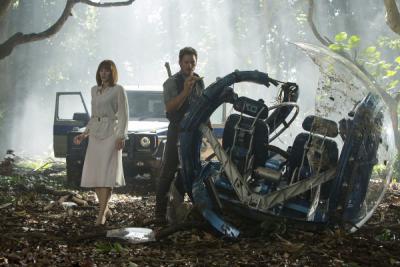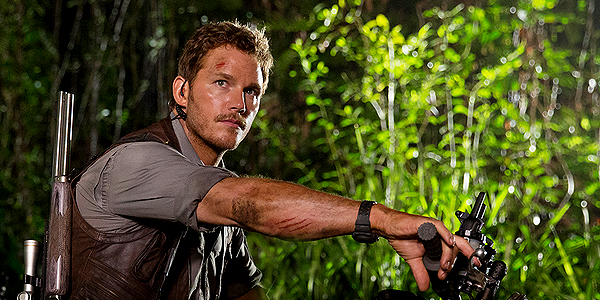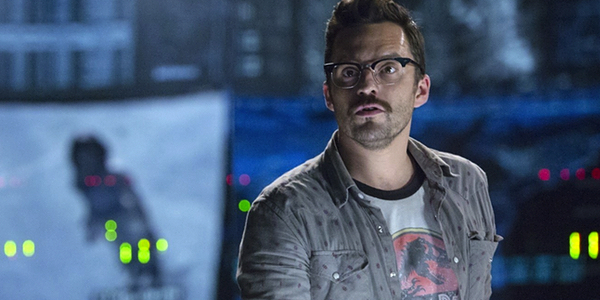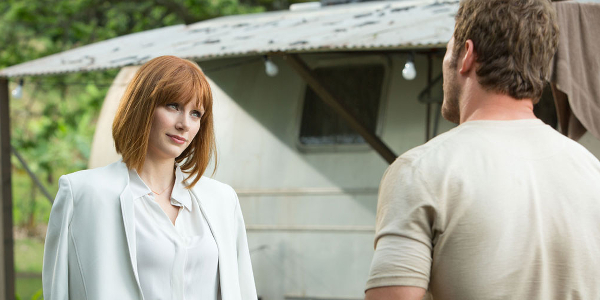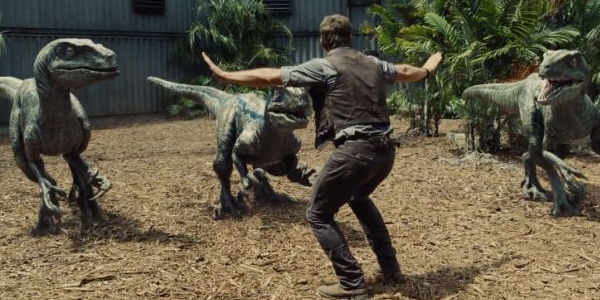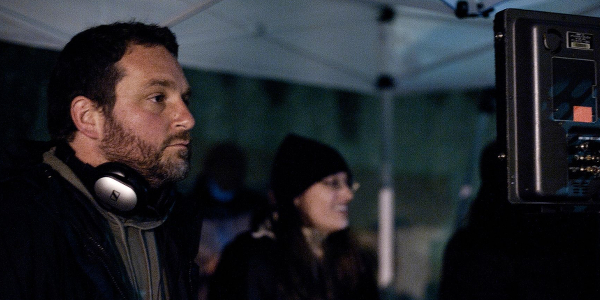Over the last few years remakes, reboots and “long-awaited” sequels have been the name of the game for many studios. From 2013’s Man of Steel and Carrie to 2014’s 300: Rise of An Empire and Annie, Hollywood has relied heavily on brand awareness and built in audiences to ensure they get warm bodies into the theater every weekend.
While the story of a fourth Jurassic Park film had been circling Hollywood since 2002, the pieces had never fit together to actually make it happen. But in June 2013, that all changed as Universal unveiled a banner for the film at the annual Licensing Expo. Though audiences were excited, experts were skeptic as to whether the demand was there for more dinosaurs. And they had good reason.
Spielberg wasn’t interested in directing (only producing), a relative newbie in Colin Trevorrow was set to direct, and none of the original cast members were interested/asked to return—in fact, they had no cast at this point. Add in that 2001’s Jurassic Park III had disappointed by clawing in ‘only’ $181 million domestically, and the film itself was going through an unusually high number of rewrites and the mere idea of a fourth film seemed like a shit storm just waiting to unleash.
But then something happened. Fast forward to opening weekend and Jurassic World is stomping everything in its path. As I write this, box-office experts are predicting a solid $204 million opening weekend number for the film. That is more than $80 million ahead of what the most generous expectations predicted on Thursday morning.
To put that number into perspective, in the last 72 hours Jurassic World has become the third highest grossing film of 2015, the 150th highest grossing film (domestically) of all time and the only film to gross more than $500 million in one weekend globally. Not too shabby for a franchise that has been DOA since 2001.
While many are expecting that number to climb by Monday morning, overtaking 2012’s Marvel’s The Avengers for the highest opening weekend of all time is irrelevant at this point. The big question on everyone’s minds now is just how Universal transformed an age-old franchise into a summer blockbuster powerhouse?
Here are five reasons Jurassic World worked and became the box-office monster it is:

1. Chris Pratt is a Star
While critics will argue that the film’s true stars are the dinosaurs, everyone knows that, in reality, Chris Pratt’s involvement got a lot of people talking. His preemptive Facebook apology for anything he said during the film’s press tour was met with laughs and humorous headlines, showing an appeal to the masses and an understanding of social media. He’s gone on record to say that Jurassic Park was the first ‘event film’ that he saw as a kid, so he exudes the passion necessary to handle such a large film. And after his brilliant turn in Guardians of the Galaxy last summer, the guy can definitely act. But more so than anything, Pratt refused to overtake the film. His press tour stops included the typical talk shows and events; however, he never overexposed himself. As a result, there was still demand for his presence when the film hit theaters late Thursday night. We weren’t tired of Pratt (though I’m not entirely sure we ever could be), and his wholesome approach to his quick rise to Hollywood’s A-List has the public rooting for his success. With this film marking his second franchise to over perform, you can expect some NYU unknown to have their small script picked up in a few weeks as Pratt will surely start experimenting with a few passion projects. So if you have a dark drama centered around a mid-century sculptor who is fighting against chlamydia and the black plague while trying to finish his career defining piece (or something as equally uncommercial), now is probably the best time to ask Pratt for some involvement. If he says yes, a studio (and millions of fans) will likely follow.

2. Something Old, Something New
While most remakes/reboots/sequels try hard to bring something new to the table and stand on their own, Jurassic World accepted its place within the confines of the universe, offering up nostalgic points when needing and keeping things rooted in the film’s detailed history, an art that fans drool over. Was it perfect? No. But seeing slight (though abundantly clear) throwbacks to the original created some priceless moments for fans. From Jake Johnson’s Lowery sporting a vintage shirt to the awesome 1992 Jeep discovery, Jurassic World understands itself, its fans and the longing for at least some universe recognition. And while many films hide the throwbacks too deep for common consumption, Trevorrow made sure that they were obvious but never unnecessary or distracting from the story’s progression.

3. Laughter
In the film’s opening seconds, the camera hovers over a reptilian foot that lands with a daunting thud into the snow. After a short pause we find ourselves face to face with…a pigeon? Yea, we just got punked.
Pratt’s casting alone let us know that the film was going to have a strong humor undertone. His past projects have allowed him to insert some degree of laughs into otherwise serious scripts (minus Zero Dark Thirty), but Jurassic World was a different situation all together.
Though intense, the film refuses to take itself seriously, quickly letting audience members in on the little surprise. From the quick banter between Pratt’s Owen and Bryce Dallas Howard’s Claire, to the witty one-liners and romantic blunders, the film never shies away from its true identity.
Additionally, the film never removes its intensity from the forefront; however, it refuses fully succumbs itself to it either. It is a unique balance that gives it a universal appeal, allowing a cross pollination of sorts as it becomes one of the few stories that can have an audience member laughing merely seconds before a prehistoric Indominus Rex tears through flesh and bone.

4. Timing is Everything
While Furious 7 ruled the box-office throughout April and Avengers: Age of Ultron owned May, June was up for the taking after Brad Bird’s Tomorrowland largely disappointed a few weeks ago.
Enter Indominus Rex.
Coming off three “down” weekends, the box office was in desperate need of a resurgence. Jurassic World proved to be positioned in just the right space to take full advantage. Think of it as a benefit of good timing…or complete luck, but it worked.
Another element of timing had to do with those who became involved in the project. Both John Krasinski and Josh Brolin had been in talks to play the film’s hero at some point or another. Not saying their either would have made a “bad” movie…it is just unlikely we’d still be having the same conversation that we are now had they gotten the part. And Chris Pratt’s ability to open a film hadn’t been proven before last year’s Guardian of the Galaxy.
Add in that eventual screenwriters Rick Jaffa and Amanda Silver got the job thanks to the success of Rise of the Planet of the Apes, their first script since 1997’s The Relic, and that the film definitely needed to distance itself from the catastrophe that is often (unfortunately) titled Jurassic Park III, and the timeline appears to have heavily worked in Universal’s favor.

5. Directors are Important
No one can ever replace Spielberg. That much we know. But when a director doesn’t want to do a project, sometimes you just have to move on. So that is what Universal did, snatching up a surging indie director in Colin Trevorrow.
Discovered after his 2012 Safety Not Guaranteed made a big splash at both Sundance and SXSW, Trevorrow proved to be a huge gamble for Universal. Having signed on prior to reading the script, Trevorrow pitched new story ideas after being disappointed with the final shooting draft that he was presented with. The new direction caused a major delay in shooting, but Universal gave a huge amount of control to the up and coming director, trusting his understanding of the younger generation and believing in his vision.
This weekend, that belief has paid off…handsomely.
Though Trevorrow’s rise from first time director debuting at Sundance in 2012 to franchise resurrector in 2015 is somewhat of a unique Hollywood success story, he isn’t the first one to be pulled from the indie world to helm a franchise film. The approach yielded Bryan Singer’s X-Men involvement as well as Gareth Edward’s take on Godzilla. The latter is now on tap to direct Star Wars Anthology: Rogue One.
Maybe there is something to earning your stripes on the festival circuit.
Hollywood executives, take note: success is created from the onset. And sometimes risks yield the best rewards.




